“I’m a Mom, and I Had an Abortion”

In our country’s discussion of abortion, one group of women remains largely unseen: mothers. An assumption persists that abortion services are used largely by teenage girls and young, childless women. But mothers are in fact the majority of patients. Many of these women know what it means to be a parent. They have stayed up all night with a colicky baby, planned birthday parties and holiday gatherings, and juggled jobs and child care. And when they become pregnant unexpectedly, they think about what another child would mean for their family. Their reasons for terminating a pregnancy are complex, from the state of their relationship, to personal finances, to reluctance to add another child to their family. For them, abortion is the choice that makes the best, or only, sense.
Still, the subject of moms having abortions remains taboo, even though the most recent numbers available indicate that 59 percent of women having abortions—nearly six in ten women—are mothers, according to the Guttmacher Institute. Approximately 1 million abortions are performed in this country every year and while an estimated three in ten women will terminate a pregnancy in their lifetime, many will remain silent. Increasingly, though, women are sharing their experiences to de-stigmatize abortion, such as with the grassroots hashtag campaign #ShoutYourAbortion. And the conversation is intensifying this summer with the Supreme Court weighing the arguments in a Texas case; the ruling could allow all states to impose further restrictions on access to abortion.
To understand what goes into a woman’s decision to terminate a pregnancy, Parents interviewed mothers from across the country. Some of the women we spoke with already had children when they had an abortion. Others had an abortion at a younger age, knowing that someday, when they were more settled in their lives, they would want children. Whatever their circumstances, one thing is certain. These women represent millions of others like them: fellow mothers on the soccer field, at the PTA meeting, or beside you at work.
Only now they are no longer invisible.
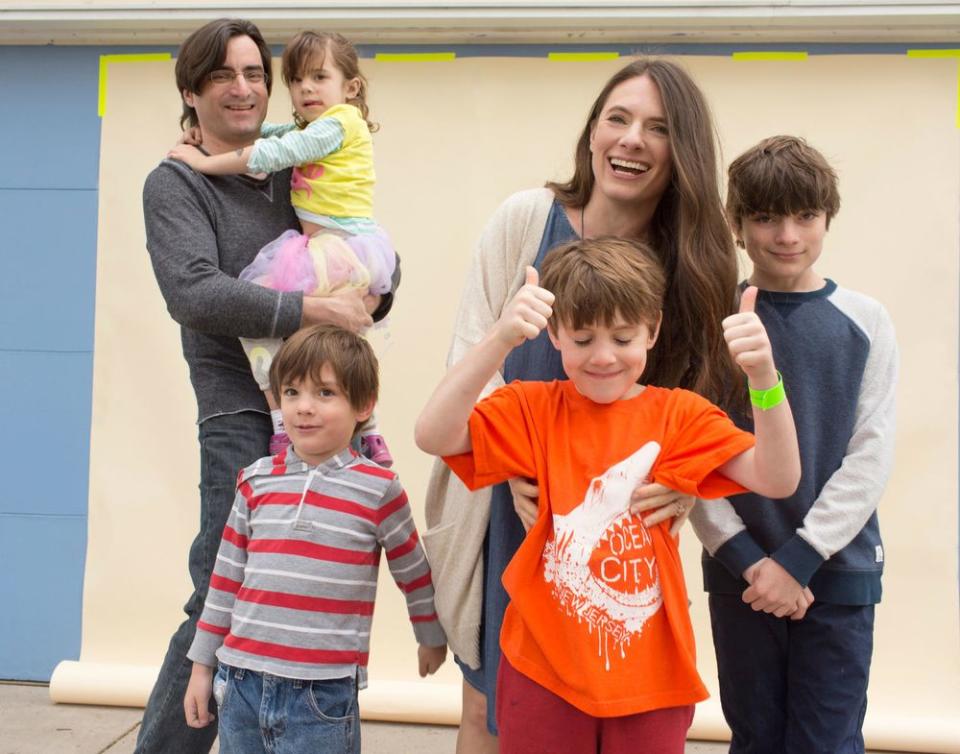
“I knew I wanted to have children, just not at 22.”
- Hannah, of Minneapolis, with her husband, Patrick, and their children (left to right): twins Naomi and Saul , 5, Raphael, 8, and Isaac, 12
It was the summer of 2012. The twins, Naomi and Saul, had just been weaned, and Hannah and Patrick were exhausted from juggling demanding jobs and child care for four kids. When Hannah discovered she was pregnant again, abortion was the obvious choice. “I think for both of us, it was an instant thing,” says Hannah, an attorney. “If you have kids and are faced with an unexpected pregnancy, you’re thinking about the kids you have and what you wouldn’t be able to give them in terms of your time, energy, and attention.”
Hannah certainly didn’t think that she could become pregnant again. Even though her first child, Isaac, was conceived easily, she struggled with infertility following his birth. When Isaac was a toddler, she miscarried—an upsetting loss. ”I was desperate to have a baby,” Hannah says. “I was devastated that I couldn’t.” Hannah gave up going to synagogue at the time because the sight of pregnant women or infants left her in tears. But over the course of six years of infertility treatments, Hannah had Raphael, followed by the twins.
As much as Hannah longed for children, there had been a time in her life when she didn’t. When she and Patrick were engaged, she had her first abortion. “I just felt completely unprepared,” she says. “I knew I wanted to have children, just not at 22.” Today, she works part-time, specializing in employment, labor, and construction law, while Patrick works in computer programming. Their family life has settled into a steady rhythm with time for music lessons, soccer practice, and regular trips to the zoo. Thinking back, Hannah says she’s grateful that she was able to decide when to have children, and when to stop. “I know people might not understand how I can terminate a pregnancy and then be upset if I lose one,” she says. “I’m a lucky person—I have a great family. I’m blessed with what I have. People need to know more about others’ experiences so we all can better understand one another and not sit back and simply judge.”
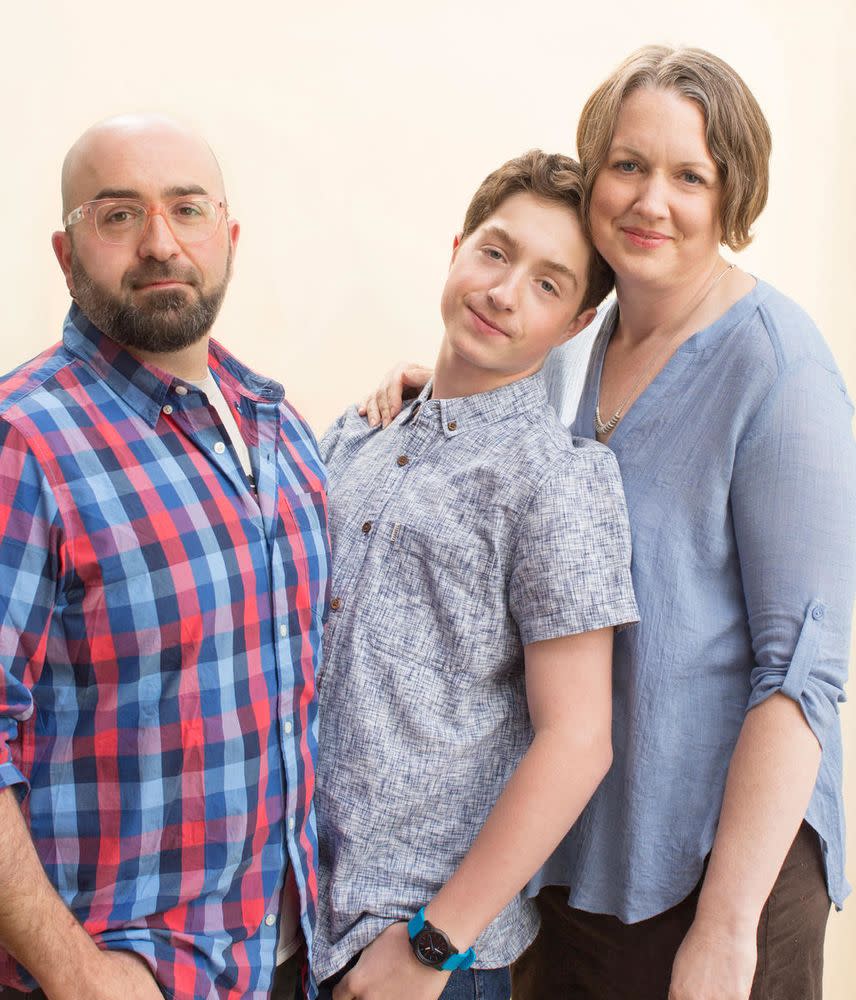
“We weren’t talking about divorce at that point, but it had crossed my mind.”
- Rev. Susan Chorley, of Boston, with her ex-husband, Frank, and their son, Franz, 14
When Susan Chorley landed her first ministerial position out of seminary at a large Baptist church outside Boston, she had a 9-month-old. It was an all-consuming job, running the youth ministry and other duties that often kept her at work through the evening. Her husband, Frank, stayed home with their son, Franz, but Frank was getting ready to return to school. The stress was taking its toll on their marriage.
Then, a year into the job, Susan became pregnant. “We weren’t talking about divorce at that point, but it had crossed my mind,” says Susan. “And I didn’t want to bring another life into a tenuous situation.”
The following year, Susan and Frank separated. The abortion made her sad, but with the marriage falling apart, she felt that their lives were too much in flux for another child. “I had envisioned myself as a mom of two children,” she says. “So there’s a little bit of sadness about that, but I think it was the best decision for our family at the time.” Today, she works at a church-based nonprofit organization, running a women’s shelter, domestic-violence prevention programs, and other services. Franz lives part of the week with her and part of the week with his father, now a designer and an art teacher.
When her son was younger, Susan often drove past an abortion clinic on their way to his school. One day, when he was 10, Franz noticed protesters and asked about abortion and what the signs meant. “Why would anyone ever choose to do that?” he asked. “I paused and felt weird about it,” she says. “And I just felt he should know. I told him once I made that decision myself, and that it was a really hard decision.” She believes he understands.
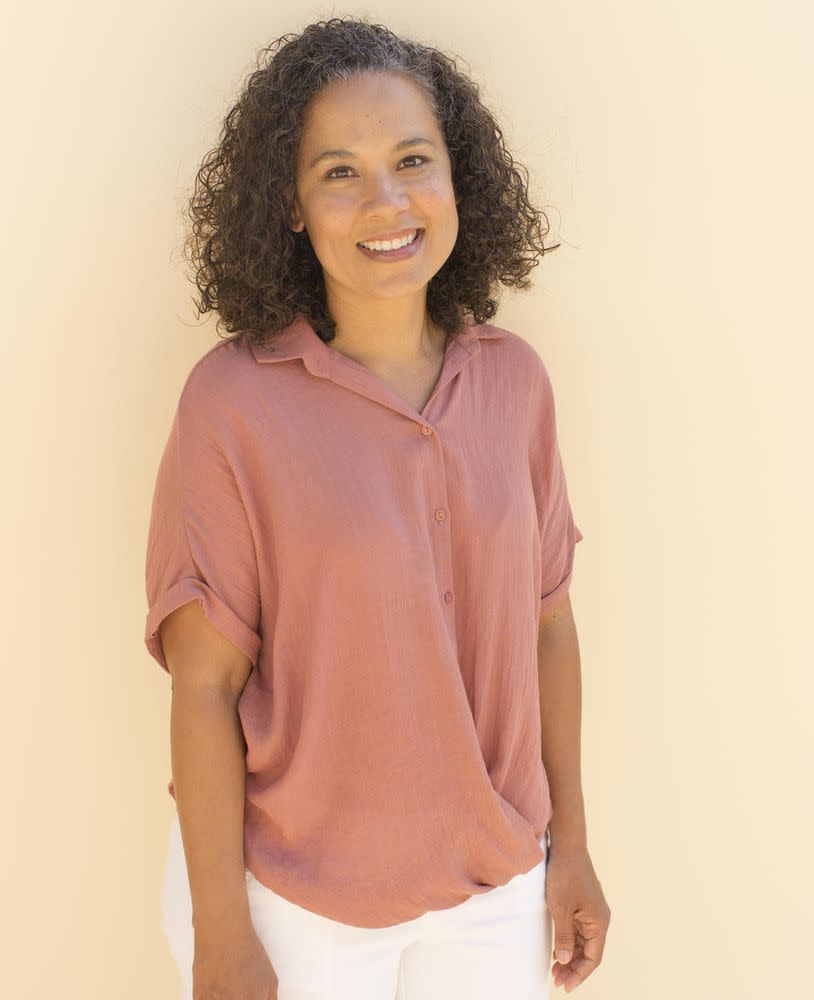
“I had friends who were struggling with fertility. There was a little bit of guilt. I could have this baby and be fine.”
- Virginia Duplessis, of El Cerrito, California. Married. Has one daughter (not pictured)
“I’m the oldest of five, and the ‘baby’ of my family is 19 years younger than I am. So in some ways, I already got to be a parent growing up,” says Virginia, who with her husband had decided they would keep their own family small. “For what I wanted to do, see, and accomplish in life, I simply felt that I could achieve those things with just one child of our own.”
When her daughter was in preschool, Virginia’s IUD failed. At the time, she was working as a doula, helping women prepare for birth and coaching them through labor. After taking the pregnancy test, she met her husband for lunch to break the news. “For a moment, I was worried that my husband would want to keep the baby,” she says now. “But he was worried that I would want to keep the baby.” They were relieved when they both agreed to an abortion.
However, Virginia surprised herself when she cried so much at the Planned Parenthood clinic that the staff thought that perhaps she was there unwillingly. “It was the right decision, but so hard,” she says. “For me it was my baby. As much as people feel uncomfortable using that language, that’s what really resonated for me.” Over the years, she has hesitated to talk about the experience. “I had friends who were struggling with fertility,” she says. “There was a little bit of guilt. I could have this baby and be fine.” She got over feeling sad years ago, however, and has never regretted her decision.
Today, Virginia works in a sexual-assault prevention program on a college campus, and her daughter is getting ready to begin high school. The Bay Area is expensive, even with two professional incomes, but with one child, Virginia and her husband lead the rich life she always envisioned, with enough money for private school, overseas vacations, and saving for college. “To me it’s so interesting that the narrative around terminating a pregnancy is that it’s this incredibly traumatic, life-changing experience,” she says. “I do think about it, but I can’t even remember when it was.”
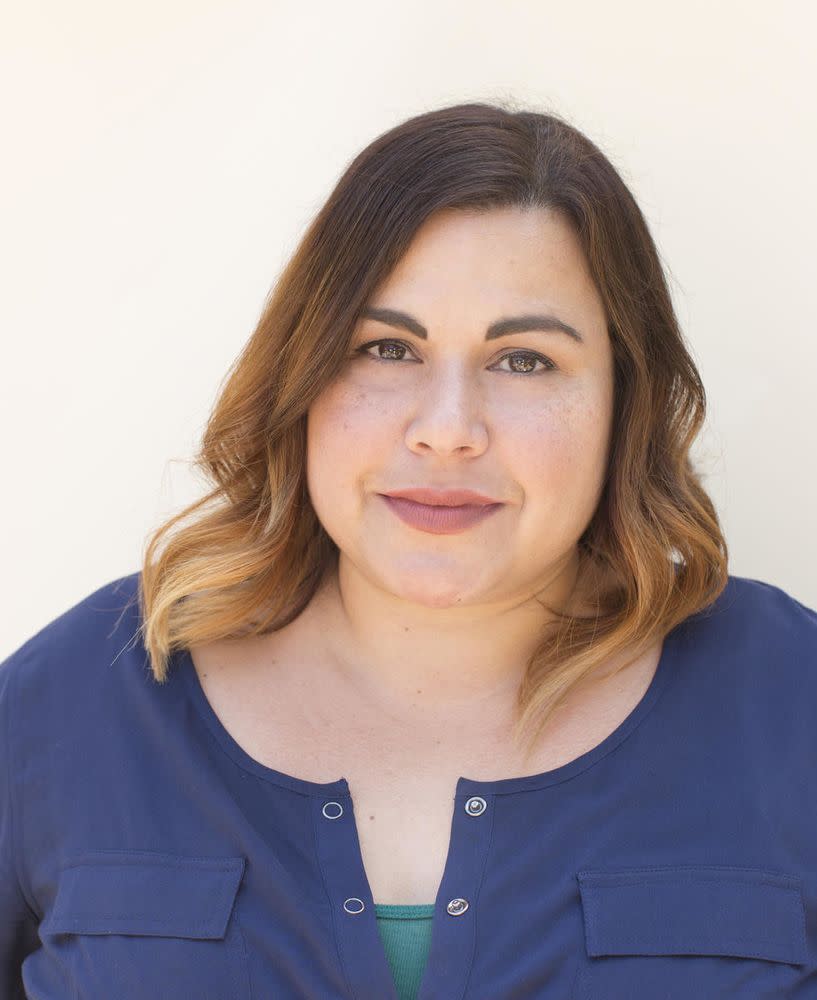
“We didn’t want to start over again.”
- Lena, of San Diego. Has one son (not pictured)
By the time she was 31, Lena and her boyfriend owned a house in the suburbs where she lived with her 13-year-old son from a previous relationship and her boyfriend’s son, who was just a year older. Lena hadn’t gone to college but had found a fruitful career in the mortgage-lending business; she worked late nights while her boyfriend worked days at a body shop. Together, they made enough to save for the future, with money left for dinners out and relaxing weekends at home. The boys, she says, were close, spending hours together as teenagers, in their room playing video games or out in the neighborhood riding skateboards or hanging out with friends.
Then Lena became pregnant. At first, she thought she had the flu. But when her doctor tested her and confirmed a pregnancy, she knew right away she didn’t want to bring a baby into their lives. “We didn’t want to start over again,” she says. “I just felt like it would have been selfish, especially since we struggled when the boys were young. We were finally at a point where we weren’t struggling.” And their teenagers needed them, maybe not in the moment-to-moment way younger children do, but they required guidance and supervision. With her boyfriend’s support, Lena made an appointment for an abortion. “We just knew,” she says. “We didn’t want another child.”
Within weeks of the abortion, Lena was laid off. The couple began arguing over money. “Our financial strain was just unbearable, and it caused a lot of fighting,” Lena says. Eventually, she and her boyfriend split up. Today, Lena’s son is away at community college, studying marketing and dreaming of becoming a rap star, and she lives with two dogs in a cottage in the city, not far from the beach.
“It’s unfortunate that my boyfriend’s and my relationship didn’t work out,” Lena says. “But at least we didn’t have a child in the middle of it.”
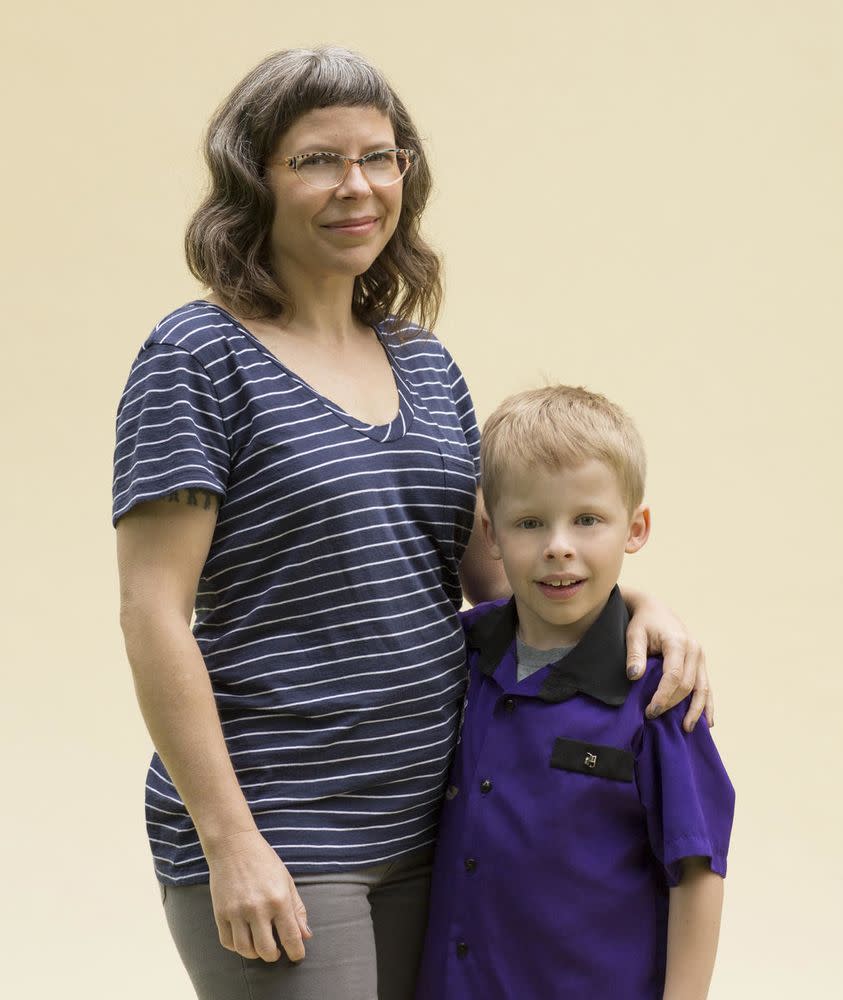
“I can bring a lot more wisdom to parenting now.”
- Ruby Sinreich, of Durham, North Carolina, with her son Izzy, 7
Ruby was 17, a rising high-school senior, when she found out that she was pregnant. At first she considered having the baby and going off to college, infant in tow. She was living in Miami with her father that year and told him she didn’t want an abortion. “I felt I had to own up to my responsibility,” she says. Then, her father’s girlfriend stepped in, asking her to reconsider. “She convinced me I could be a better mom if I waited,” says Ruby.
Once settled into college life, at UNC Chapel Hill, Ruby came to see how impossible it would have been for her to raise a baby in a dorm room. At 18, she was busy with her studies and with student activism. After graduation, she worked for a series of nonprofit organizations—including Planned Parenthood—developing websites and later social-media strategy. She doesn’t remember ever talking about the abortion, or questioning her decision. When she was in her mid-30s, still single and wanting a child, “I wondered if I had lost my one chance,” she says.
At 35, Ruby married a fellow Web developer, in large part because they knew they wanted a child. Her son, Izzy, was born three years later. By then, married and settled in a career, she felt ready to be a mother. “I had my son 20 years after I had the abortion,” she says. “I can bring a lot more wisdom to parenting now.”
Today, Ruby and Izzy’s father are separated, sharing custody. Izzy has just finished first grade. Last September, Ruby tweeted about her abortion at #ShoutYourAbortion. Hundreds of people responded, some calling her selfish and immoral. However, she also heard privately from friends, grateful to her for bringing abortion out of the shadows. “There were a lot of people who thanked me because they can’t talk about their abortion,” she says. “So I felt I was speaking for them.”
CREDITS: Wardrobe styling by Amy Soderlind for Workgroup. Grooming: for Hannah: Julie Lam for Wehmann Models & Talent. For Susan: Bryan Lynde. For Ruby: Tara DiPetrillo. For Virginia and Lena: Tricia Turner.

